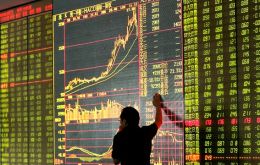MercoPress. South Atlantic News Agency
Economy
-
Friday, November 30th 2007 - 20:00 UTC
Booming S. Korea, 11th largest trading country in 2007

South Korea is expected to edge past Hong Kong to become the 11th largest trading nation in the world this year, the Seoul government agency Yonhap reported on Friday.
-
Friday, November 30th 2007 - 20:00 UTC
Every two containers in the Pacific, one is from China

The number of container units handled by China's mainland ports this year hit 100 million this week, highlighting the country's position as a major player in the industry worldwide, reports China's Daily.
-
Friday, November 30th 2007 - 20:00 UTC
Chinese markets recover and edge above 5.000 points

Chinese stocks made a big comeback on Thursday to edge just over 5,000 points again, recovering part of the more than 20% losses in less than two months reports China's Daily.
-
Friday, November 30th 2007 - 20:00 UTC
Frosts cut Argentine wheat production by 1.2 million tons

According to the first reports late frosts in early November could have cut Argentina's expected wheat production by an estimate of 1.5 to 2 million tons according to wheat farmers organizations.
-
Thursday, November 29th 2007 - 20:00 UTC
Cyprus and Malta will introduce the Euro next January
The European Union said that member nations Cyprus and Malta are prepared to introduce the Euro next January first, which will bring to 15 the number of nations sharing the currency.
-
Thursday, November 29th 2007 - 20:00 UTC
Wheat futures soar as Argentina suspends export registrations

United States wheat futures soared Wednesday as Argentina stirred up fears about global tightness by announcing a suspension of wheat export registrations until it assesses the impact of recent frosts.
-
Thursday, November 29th 2007 - 20:00 UTC
EU agriculture reform blueprint passes first test

European Union farm ministers gave a fairly warm welcome this week to a blueprint for reforming agriculture policy, focusing on ideas for making countries spend more on rural development and planned subsidy ceilings for large farms.
-
Thursday, November 29th 2007 - 20:00 UTC
EU warns China of “backlash” if trade gap persists
The European Union trade commissioner warned that China needs to close the trade gap if it wants to prevent a backlash in Europe. Peter Mandelson said that China has become the EU largest trading partner and this status must make Beijing assume “real responsibilities”.
-
Thursday, November 29th 2007 - 20:00 UTC
China agrees to eliminate industrial sectors' subsidies

United States Trade Representative Susan C. Schwab announced Thursday that China has agreed to terminate subsidies that the US alleged were illegal under World Trade Organization (WTO) rules.
-
Wednesday, November 28th 2007 - 20:00 UTC
Argentine wine exports set for another record year
Exports of Argentine wine are set to rise 20% this year to record levels, with a weak local currency giving the country's vineyards a competitive edge, according to a study published over the weekend.
